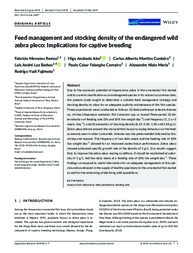Feed management and stocking density of the endangered wild zebra pleco: Implications for captive breeding.
Feed management and stocking density of the endangered wild zebra pleco: Implications for captive breeding.
Author(s): RAMOS, F. M.; ABE, H. A.; CORDEIRO, C. A. M.; BARBAS, L. A. L.; CARNEIRO, P. C. F.; MARIA, A. N.; FUJIMOTO, R. Y.
Summary: Due to the economic potential of Hypancistrus zebra in the ornamental fish market and its current classification as an endangered species in its natural occurrence sites, the present study sought to determine a suitable feed management strategy and stocking density to allow for an adequate captivity maintenance of this fish species. Three experiments were conducted as follows: (1) feed preference (artemia Artemiasp., shrimp Litopenaeus vannamei, fish Cynoscion spp. or mussel Perna perna); (2) de‐termination of feeding rate (5% and 10% live weight day−1) and frequency (1, 2 or 3 meals. Day−1); and (3) evaluation of stocking density (0.25, 0.50, 1.00 and 2.00 g/L). Zebra pleco did not present the characteristic buccal scraping behaviour on the feed, commonly seen in other Loricariids. Artemia was the preferred diet followed by fish, shrimp and mussels. The frequency of two daily meals and the feeding rate of 10% live weight day−1 allowed for an improved zootechnical performance. Zebra pleco showed enhanced specific growth rate at the density of 2 g/L. Our results suggest that, to improve the zebra pleco rearing conditions, it should be maintained at a den‐sity of 2 g/L, fed two daily meals at a feeding rate of 10% live weight day−1. These findings correspond to useful information for an adequate management of this spe‐cies and could assist in the supply of healthy specimens to the ornamental fish market as well for the restocking of declining wild population
Publication year: 2019
Types of publication: Journal article
Keywords: Fish, Fish culture, Peixe, Peixe Ornamental, Piscicultura
Observation
Some of Embrapa's publications are published as ePub files. To read them, use or download one of the following free software options to your computer or mobile device. Android: Google Play Books; IOS: iBooks; Windows and Linux: Calibre.
Access other publications
Access the Agricultural Research Database (BDPA) to consult Embrapa's full library collection and records.
Visit Embrapa Bookstore to purchase books and other publications sold by Embrapa.

